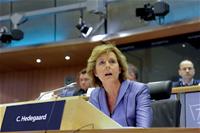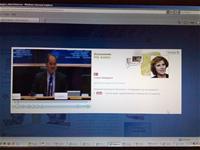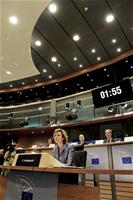Connie Hedegaard: The problem is that Europe does not speak with one voice
euinside, January 16, 2010
 Very pleasant hearing was the one of the most appropriate Commissioner-designate for the field of Actions for Climate Connie Hedegaard. The Danish minister of the environment and climate change was nominated for the brand new position in the second Barroso Commission. She recently presided most of the UN climate conference in Copenhagen in December. Another reason for her being the most appropriate candidate is that she comes from a country with the highest share of renewable energy sources in the EU and is a leader in green technologies. Almost all MEP started their questions with the statement that Connie Hedegaard was the best choice in the new Commission. She was also praised for being the first candidate who used precisely the time given for statements and replies. She was never interrupted for overtime.
Very pleasant hearing was the one of the most appropriate Commissioner-designate for the field of Actions for Climate Connie Hedegaard. The Danish minister of the environment and climate change was nominated for the brand new position in the second Barroso Commission. She recently presided most of the UN climate conference in Copenhagen in December. Another reason for her being the most appropriate candidate is that she comes from a country with the highest share of renewable energy sources in the EU and is a leader in green technologies. Almost all MEP started their questions with the statement that Connie Hedegaard was the best choice in the new Commission. She was also praised for being the first candidate who used precisely the time given for statements and replies. She was never interrupted for overtime.
In the very beginning of the hearing the chairman of the parliamentary Committee in environment, healthcare and food safety Jo Leinen (from the group of socialists and democrats) set up the tone of the discussion by saying: "We hope you have rested well after the Copenhagen marathon. Our disappointment from Copenhagen is enormous but it raises hopes for Mexico. There are new initiatives here in the EU but what we want to achieve is included in your portfolio and will have to be integrated and connected to other fields in the Commission". Most of the questions to Ms. Hedegaard were all in this spirit. She is a former journalist and she demonstrated good self-confidence, pathos and belief in the work she is supposed to do if approved, which is almost certain.
A main focus in her replies though was that the EU is on its way to lose the hopes for a leading role in climate change because it does not speak with 1 voice. "The last hours of the summit (in Copenhagen) and China, and India, and Japan, and Russia, and the US spoke with 1 voice while Europe spoke with many and, often, controversial voices. It is proved that when the EU enters in international negotiations we prove to be almost incapable to negotiate. This is something which we definitely must improve". Later in front of journalists Connie Hedegaard explained that it was not about whether 1 person would talk on international forums but simply that EU's position should be just one.
"My experience as a minister is that sometimes it appears that you have to negotiate with a non-flexible mandate - you stand with your hand tied and cannot play your cards. This is a situation we need to avoid in the future", she added. Another risk for EU's leading role in the field is the fast development of green technologies in countries like China, the US and Japan.
The Danish minister promised something which is very important - to try by 2015 to introduce  the international carbon emissions market in as many OECD (Organisation for Economic Cooperation and Development) countries as possible as well as to connect the European Carbon Trade scheme with the American one - also by 2015.
the international carbon emissions market in as many OECD (Organisation for Economic Cooperation and Development) countries as possible as well as to connect the European Carbon Trade scheme with the American one - also by 2015.
Special attention should be paid to the carbon emissions from shipping. Connie Hedegaard shared that she hoped the issue to be included in the Copenhagen agreement or at least to be planned for the Mexico draft agreement which will be discussed in the end of the year. To the criticism that in fact Copenhagen was a big failure and how she would manage to work in such an environment, the Danish candidate said: "Only several years ago who could dare even think that we will have 1 main achievement in the EU? Even the emerging economies to take a responsibility? We cannot just blame people for the fact that we actually succeeded in achieving a tipping point in international politics".
Ms. Hedegaard also explained, regarding the numerous publications in the Eu in the last months that climate change fight will lead to the renaissance of nuclear energy, that "in my universe nuclear energy is not renewable one".
She also demonstrated a very good political sense after managing to explain in 1 sentence that the construction of a pipeline on the bottom of the Baltic Sea would harm the environment for sure but in the same time would help Europe's energy independence. "Maybe, the ecological criteria should step back a little in the name of choice".
The discussion went on in a quite friendly atmosphere. Asked about a carbon tax said she would be cautious at least until an international agreement for the climate was signed in Mexico. However the most effective way of work at this stage was the emissions trade scheme, she said. Asked whether the low price of carbon was a problem, Connie Hedegaard explained that the price was market based and if a floor was put (bottom limit) later the business might want a ceiling to be introduced and this would not help the general target - reduction of emissions.
 A better way to regulate prices would be political regulation by preventing the provision of too many quotas. Regarding the contribution of the new EU member states which for 50 years were unable to plan well the development of their industries, the Danish Commissioner-designate said that those countries should be compensated for their existing plans. However for the future plans everyone should have equal opportunities.
A better way to regulate prices would be political regulation by preventing the provision of too many quotas. Regarding the contribution of the new EU member states which for 50 years were unable to plan well the development of their industries, the Danish Commissioner-designate said that those countries should be compensated for their existing plans. However for the future plans everyone should have equal opportunities.
And about whether the EU would commit to reduce its emissions by 30% by 2020 instead of 20%, the candidate said that it all depended on China - whether Beijing would offer a concession from "business as usual" or not.
The hearing of Connie Hedegaard ended with vigorous applauses and satisfaction of the members of the committee and its chairman. Later in a press release the group of the Greens in the European Parliament for the first time expressed satisfaction with a candidate with no reserves: "Connie Hedegaard has shown that she has the political will and vision to be a strong first EU Climate Commissioner. The success of her mandate will however depend on whether Commission President Barroso lends the political support to mainstream climate policy into other sectors, including transport and agriculture. Over the next five years Barroso must prove that he created this post to protect the climate, not as a PR stunt", the Finnish Green MEP Satu Hassi stated.